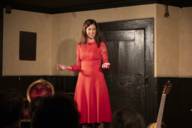
In her stage programme, Claudia Pichler, as she puts it, sees white and blue. Or is it red? An evening with the cabaret artist and Bavarian dialect expert.
Claudia Pichler begins with just four words – enough to win over the audience. Through a wooden door, she steps onto the stage, designed to resemble an old farmhouse parlour: Dark panelling lines the walls and a window offers a glimpse of a simulated rural scene.
Wearing a red dress and a smile, Pichler takes a few steps forward, glancing at the audience, seated closely around her in Munich's Iberlbühne (theatre). Her smile widens, becoming even more captivating; resisting her charm feels nearly impossible. “Ja servus, griaß eich!” – Hi, good day to you!
Claudia Pichler is a cabaret artist and presenter, a Bavarian expert with a doctorate in German studies, a native of Munich and a Bavarian. Her programme reflects this heritage: “A Woman Sees White and Blue“ is the title of her one-and-a-half-hour one-woman show which she performs tonight. However, the title also hints at something unexpected about Pichler: She doesn't just see white and blue, she can also see red – and knows exactly how to deliver a sharp verbal punch when she wants to. Always, with a smile, of course.
Born in 1985, Pichler is not someone to be underestimated. She would never describe herself as someone who craves the limelight; in one-on-one conversations, she is composed and carefully chooses her words. But the moment she steps on stage, she effortlessly commands the room, casting a spell over the audience.
That's precisely what happens at the Iberlbühne. From the very first moment, the audience is glued to her lips, she sweeps them away as if she had been doing nothing else for decades.
Yet she has only been active as a cabaret artist for a few years. Before she stepped into the limelight, she completed her doctorate with a thesis on the humour of the well-known Bavarian cabaret artist Gerhard Polt. And yes, Pichler wrote the dissertation herself, she assures us from the stage with a grin – “which is more than some people can claim,“ she quips, alluding at the many politicians who have stumbled in their carrier in recent years because of improperly earned doctorates.
“Vinegar essence, oh vinegar essence, you don't care about fashion trends!“
Pichler likes to deliver punchlines like this one with a disarming smile, making them hit all the harder. And then there's the Bavarian dialect, which adds another layer to her humour. It's almost impossible to translate her jokes into standard German without losing much of their charm.
So, those in the audience who have at least a rudimentary knowledge of Bavarian will have a good laugh, while everyone else will have to listen carefully to find out what drives and inspires Pichler – for example, her dream of earning a royal title. Unfortunately, positions like Beer Queen and Weisswurst Princess have already been taken. “But one product is still up for grabs,” says Pichler and picks up her guitar to sing an ode to the “crowning glory in sausage salad”: “Vinegar essence, oh vinegar essence, you don't care about fashion trends!’
Put simply, Pichler falls into the latter of two cabaret categories: those who focus on political satire and those who deal with the absurdities of everyday life. Although she occasionally targets the powerful, she is mostly concerned with the peculiarities of life – plenty of which inspire what she presents as her life on stage.
Her punchlines often defy expectations. Take her reflections on the joys of gardening, for instance: Her robotic lawnmower sometimes makes amusing noises as it accidentally runs over a vole. And when it caught a mole? She says that was “really sad.“ Why? “Because all the electronics were ruined straight away.”
Or take her supermarket-inspired musings on the love life of a flesh fly named Alois Brummer: “In the fruit department he lost his heart / He's tormented by lovesickness.” Alois becomes vegan for the sake of a fruit fly called Jessica.
This is followed by an ode to the power of being single: Changing tyres, vacuuming spiders, tapping a beer barrel – none of this is a problem. But sitting alone in front of the TV on a Sunday evening?
The absurdity of everyday life also shines through in Pichler's focus on love as the central theme of the evening, as she demonstrates there is no way to escape love and its consequences.
When asked about what the male world does, she replies: “I have no idea! How am I supposed to know?” She concludes the evening with a song about love, followed by an ode to the power of being single: Changing tyres, vacuuming spiders, tapping a beer barrel – none of this is a problem. But sitting alone in front of the television on a Sunday evening? “Tatort, Tatort,” she laments, referring to the cult German crime series, “you make my world a lonelier place.” And she smiles.
It's clear: Claudia Pichler should be taken seriously – but perhaps not too seriously.